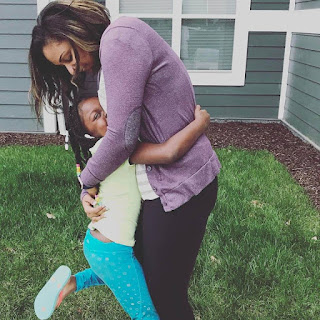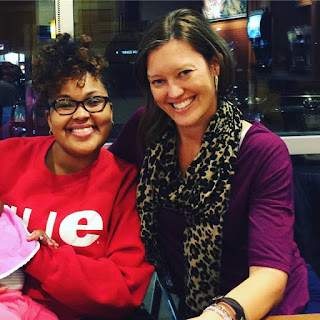-Me and my hubs at our 4th child's gender reveal photo shoot. This was the first time we did a photo announcement, including the gender of the baby we were matched with. -
Dear Sugar,
Today I'm tackling a question many of you have asked: Should I announce an adoption match?
One year ago this month, we were matched with an expectant couple due in September. This was our longest match, and I was a mess. In fact, I did the thing I said I would never do. I fell in love with a baby who wasn't mine.
This wasn't our first rodeo. After all, we had already adopted three children. But the fourth adoption was particularly challenging, mostly because the match seemed endless. And I had already told God: no out-of-state matches, no long matches. I want easy-peasy. Got it?
Get that, Sugar? I told God. Then God laughed. Amen? Moving on.
With our first two adoptions, we didn't tell anyone we were matched (with babies already born) until after we went to court. Call it not wanting to jinx anything or just being very very respectful of the biological families...but we didn't.
With our third, we had about two-and-a-half month match. We told our families and close friends. We let them know the baby was a boy. And then we went nuts. Everyone wanted to know the name, had a hard time keeping their mouths shut. Their anticipation only added to my anticipation. And when I say anticipation, I meant anxiety.
With our fourth baby, we did tell our family and close friends. The match was long, and keeping the match a secret was nearly impossible, especially after we told our children what was going on. Plus, we're really big on "no secrets" in terms of our kids' safety and well-being. We even did a gender reveal photo shoot (see pic above).
There is no right or wrong to telling others that you're matched, but I will say these are lines I think an ethical, hopeful parent shouldn't cross:
-calling the baby yours. The baby isn't yours. The pregnancy isn't yours. The baby is a possibility and a hope.
-calling the baby's mother "our" birth mother. The baby's mother is the baby's mother, not a birth mother (if and until she places). And the "our" is just weird. She's not YOUR birth mother or mother. She's the baby's. The baby is hers.
-having a baby shower specific to the baby you are matched with. Don't get bibs with the baby's name monogrammed on them, for example. It's ok to be excited, but there is no guarantee of placement, no matter how certain and convinced you're told the expectant mother is.
Of course, each situation is very different, and there aren't any definites in terms of feelings and the closeness of the relationships. But there are ethical boundaries to keep in mind, something I've written about here and elsewhere.
No amount of announcing (or not) guarantees the placement will happen. So I urge you to move forward with grace. If you are matched, proceed with caution and the utmost respect for the expectant parent(s)---which, essentially, is the utmost respect for the child. Be excited, but be ever-mindful that you are not yet mom. Fall in love, as I did, with the one who isn't yours, knowing that if the match results in a placement, you loved with reckless abandon while still respecting each person.









































